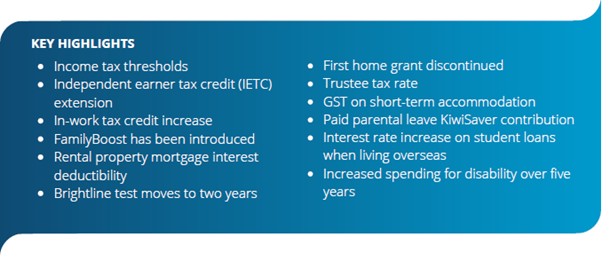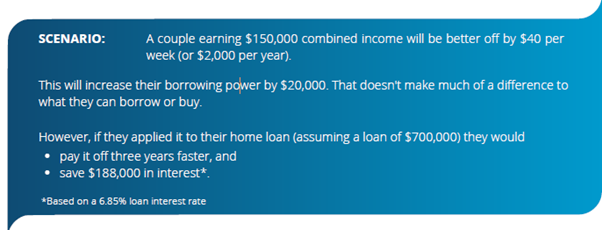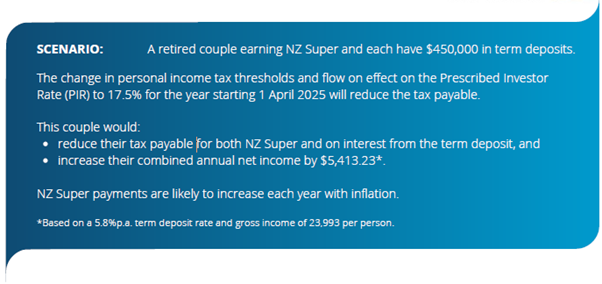New Zealand Budget 2024

On 30th May, the New Zealand Government released the National Budget 2024. We have
shared below highlights of the Budget which may have implications to wealth creation and
retirement plans, property, and family cash flow decisions.

TAXATION
INCOME TAX THRESHOLDS CHANGES
The personal income tax rates thresholds increase from 31 July 2024, excluding the tax rate for income
over $180,000 per annum.


INDEPENDENT EARNER TAX CREDIT EXTENSION
The upper limit of the eligibility for the Independent Earner Tax Credit (IETC) will be extended from
$48,000 to $70,000 per annum. Those earning $24,000 to $66,000 per annum will receive the full $20 per
fortnight credit. The entitlement reduces gradually for income between $66,001 and $70,000. This is
effective from 31 July 2024.
IN-WORK TAX CREDIT INCREASE
The In-Work Tax Credit (IWTC) is a tax for families with dependent children who are normally in paid work
if the annual family income after tax is less than $35,204. The increase is up to $72.50 per week ($3,770
per year) to working families for the first three children and up to $15 extra a week for each additional
child. This is effective from 1 July 2024.
FAMILYBOOST
From 1 July 2024, parents and caregivers will be eligible for a partial reimbursement of their early
childhood education (ECE) fees, up to a maximum fortnightly payment of $150. Reimbursements will be
made quarterly, as a lump sum. The first payments will therefore be made from October.
This maximum payment slowly reduces for family incomes over $140,000 per annum. Families with
incomes over $180,000 per annum are not eligible for FamilyBoost.
PROPERTY
RESIDENTIAL PROPERTY TAX
Effective since 1 April 2024, the ability to claim interest deductions on residential property investments has been phased back in. Between 1 April 2024 – 31 March 2025, 80% of interest can be claimed. From 1 April 2025 onwards, 100% of interest can be claimed.
BRIGHTLINE TEST
The brightline test will be reduced from ten years to two years on all properties from 1 July 2024. This may bring more properties to the market as it removes a barrier to selling. The higher costs of insurance and potential raises in local council rates are detracting property investors.
The changes to the brightline test may help some investors rebalance their portfolios given the impact of the introduction of Debt-to-income (DTI) ratios limiting the ability to borrow in the future.
FIRST HOME GRANT
The first home grant has been discontinued. First home loans are still available, enabling first home buyers to only need a 5% deposit for their first house, based on eligibility criteria.
First Home Loans are issued by selected banks and other lenders, and underwritten by Kāinga Ora. This
allows the lender to provide loans that would otherwise sit outside their lending criteria.
INVESTMENT & SAVINGS
PERSONAL INCOME TAX
The changes to the tax thresholds impact other taxes, including fringe benefit tax (FBT), employer
superannuation contribution tax (ESCT), residential withholding tax (RWT) and prescribed investor rates
(PIR). Clients will need to review the implications with their financial advisers
TRUSTEE TAX RATE INCREASES
The new tax rate for trustees announced last year is effective from 1 April 2024. The trustee tax rate is
39% for the 2024-2025 and later income years. Reviewing trusts and considering using portfolio
investment entities (which have a maximum tax rate of 28%) may minimise the impact of the tax changes
GST ON SHORT-STAY ACCOMMODATION
Clients who be impacted by the new Goods and Services Tax (GST) on short-term accommodation. Online
marketplace operators must collect and return GST of 15% when the service is performed, provided, or
received in New Zealand. This applies to New Zealand and offshore operators. Holiday rental cleaning fees would also be subject to GST. Accommodation used by the customer as their principal place of residence is exempt.
A new flat-rate credit scheme will apply for sellers who are not GST registered. Marketplace operators will
collect GST at the standard 15% rate. They will pass on 8.5% to sellers who are not GST registered. The
remaining 6.5% will be paid to the Inland Revenue Department. These are excluded income for income tax purposes.
PAID PARENTAL LEAVE KIWISAVER CONTRIBUTIONS
Parents who choose to have KiwiSaver deducted from their paid parental leave payments will receive a 3%
Government contribution to their KiwiSaver fund. The contribution would be liable for employer
contribution tax (ESCT). This is effective from 1 July 2024.
NZ SUPER AND DISABILITY SUPPORT
RETIREMENT
The changes to the Personal Income Tax threshold will mean some people receiving NZ Super will get
more in hand if they’re on the ‘M’ tax code. The after-tax rate for NZ Super may increase by up to $4.30
per fortnight. No changes apply if clients are on a ‘S’ tax code.

INCREASE IN SPENDING FOR DISABILITY SUPPORT SERVICES
The government has allocated $1.1 billion over five years to ensure the Ministry of Disabled People
Whaikana can continue to deliver critical disability support services.
This funding is an addition to the government’s more than $2.2 billion per annum investment in disability
support services. The support services include home and community support services, respite care
community residential care, environmental support services, and the High and Complex Framework
Strategy.
PRESCRIPTION CO-PAYMENT
From 1 July 2024, the $5 co-payment for fully subsidised prescription items from publicly funded health
providers will return for everyone except people aged 65 and over, community services cardholders and
under 14-year-olds.
STUDENT LOANS & FUNDING
HIGHER INTEREST RATE WHEN LIVING OVERSEAS WITH A STUDENT LOAN
The Budget 2024 has introduced some significant changes to the overseas student loan system. The
interest rate charged to student loan borrowers who are based overseas will increase by 1% for five years,
taking effect from 1 April 2025. The new rate is forecast to be 4.9%.
FEES FREE SCHEME
The Fees Free Scheme for the first year of study and training will end at the end of 2024. It will be replaced with a final-year fees free scheme starting from January 2025.
APPRENTICESHIP BOOST
The Apprenticeship Boost initiative will continue with ongoing funding. From 1 January 2025, only first-year apprentices in targeted industry areas will be eligible for the $500 per month subsidy.
This information in this document is provided by Financial Advice New Zealand. It may include general information based on online government announcements and Ministry websites. It does not consider your individual objectives, financial situations, needs or tax circumstances. We recommend consulting with a financial advice professional to discuss your specific needs. Find an adviser at financialadvice.nz
Share This:
More Blog Posts:
 Beware the hidden costs of indexing
Beware the hidden costs of indexing Insurance Premiums - why are they increasing so much?!
Insurance Premiums - why are they increasing so much?!
 When the Face You Trust Is Fake: Why Deepfakes & AI-Driven Scams Are a Real Threat
When the Face You Trust Is Fake: Why Deepfakes & AI-Driven Scams Are a Real Threat